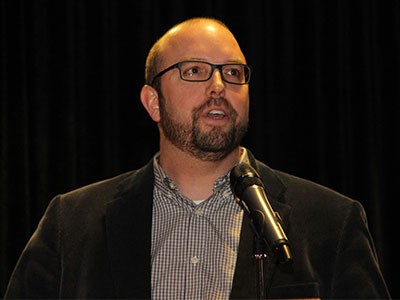Don Duval stood tall and proud when he introduced the first of four start-up companies to a Sudbury crowd of potential angel investors and community leaders.
The NORCAT CEO was eager to show off what he calls Sudbury's “exceptional entrepreneurial spirit” at a May 8 inaugural event for angel investors in attendance that was part Dragons’ Den and part business incubator in action.
Four startups each had 10 minutes to prove they were worthy of hundreds of thousands of dollars in investment.
“Sudbury Pitch is really formulated around the concept that many of these early-stage companies are great equity plays. Meaning there is a lot of high net worth individuals in the community that can write big cheques. These companies have great valuations,” Duval said.
One company, Leak Prevention Ltd., devised an early warning system for pipeline operators to stop leaks before they happen.
The company's patented technology coats pipelines with a special paint that blocks a weak electrical current. The smallest puncture exposes the metal below, which transforms the pipeline into a thousand-kilometre long game of Operation.
But instead of a loud buzzing sound, and the board game patient's nose lighting bright red, the operator is alerted in realtime where the paint may have been nicked.
They can then choose to take corrective measures and avoid a spill that would be costly to both the environment and their pocketbooks.
Sudbury entrepreneur Jeff Fuller, company chair, told three panellists he would bring the expertise he has developed in the mining sector, through his mining supply company Fuller Industrial, to the oil and gas sector.
Another company, Verv, developed an inexpensive point-of-care filtration system to separate plasma from blood, typically done in a lab centrifuge.
CEO Jeff Sutton’s company has developed a material with “fantastic” filtration capabilities that does the same job as a centrifuge for a small fraction of the cost.
Pending approval from Health Canada, and the U.S. Food and Drug Administration, patients could potentially buy them with approval from their doctors.
Sutton asked the angel investors in the room for a $650,000 investment to finish development and market themselves to large medical device manufacturers. His plan is to license the device to those manufacturers and make money on royalties.
“The market for point-of-care testing is $50 billion a year,” Sutton said. “The market is enormous and growing.”
But the expert panel, made up of Peter Evans, founder and CEO of Expertfile; Tom Fortin, CEO of Ontrak Controls; and Michael Atkins, president of Laurentian Media Group, were lukewarm on his reliance on other companies to manufacture his device, rather than do it himself.
The panel was meant to collect more information on each company on behalf of the angel investors in the room.
A third presenter was Sheri Tomchick, CEO of Plan A Scheduling Solutions, who developed a software solution for staff scheduling in the health-care sector.
Through a collaboration with Sunwire Inc., her software solution automatically sends staff emails, texts or phone calls based on pre-determined schedules. “You can fill 75 shifts in less than an hour,:” said Tomchick, who asked for $750,000 for marketing and to update her software and hardware solution.
She won the People's Choice Award, based on audience voting, which came with a $25,000 prize package.
The final company was Rna Diagnostics, a company that has developed a method that could see breast cancer treatments tailored to the particular genetic makeup of the patient.
Doctors can determine if chemotherapy would effectively attack a patient's cancer, and avoid it if there are other options available that would be more effective with fewer harmful side effects.
The technology was developed at Sudbury's Advanced Medical Research Institute of Canada.
No deals were signed the night of the Sudbury Pitch event, but Duval said it was a chance for the companies to make strong first impressions with potential investors. He said it could take several months before money starts to exchange hands and the companies have opportunities to grow and create capital.




